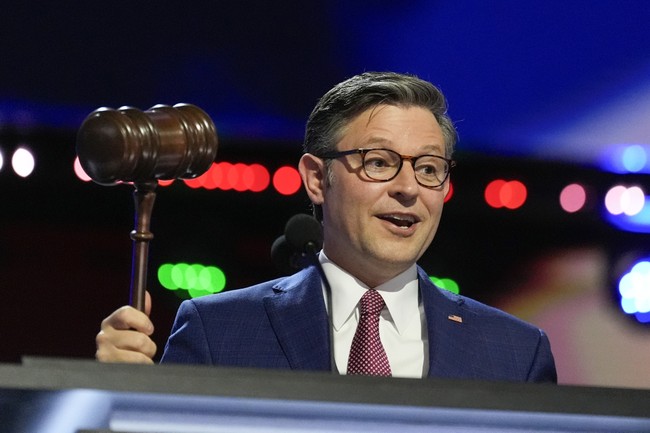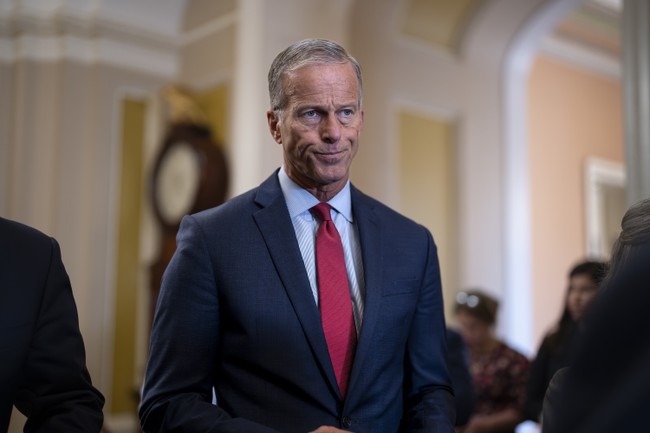Republican Leadership Dynamics Unfold
Political maneuvering intensifies as House Speaker Mike Johnson retains position amid Republican discussions of strategy. Trump's influence expands with potential pivotal implications.
Published November 14, 2024 - 00:11am

Image recovered from redstate.com
In the latest turn of political developments, the Republican Party is consolidating its leadership, forging alliances, and setting the stage for an agenda that aligns closely with the objectives of President-elect Donald Trump. Amid these changes, Mike Johnson, a Republican from Louisiana, stands firmly as the speaker of the House of Representatives, having retained his position after the recent internal nomination process. His role cements as Republicans strive for a stable leadership structure amidst the shifting political climate.
This period of consolidation was marked by a closed-door meeting where Republican members deliberated on their future leadership strategy. With President-elect Trump's endorsement, Johnson's candidacy was further strengthened, although dissent remains from the party's hard-right factions and the influential Freedom Caucus. While some GOP members are holding out support reflecting their dissatisfaction over government spending and fiscal policies, Johnson's leadership seems assured barring significant opposition.
As the Republican Party prepares for the incoming Congress, reflective of the outcomes in the 2024 elections, it finds itself in a favorable position with a unified control over both chambers of Congress and the executive branch. This outcome, heavily influenced by a Republican-favored senatorial map and notable electoral victories, places the GOP in a pivotal role to shape the legislative agenda. This scenario offers President-elect Trump and his associates a legislative powerhouse to pursue their policy objectives.
Republicans holding a marginal majority in the House face the challenge of internal divisions, a factor compromising Kevin McCarthy's speakership outfit, paving the way for Johnson's election. Despite Trump's backing, Johnson's leadership is likely to face hurdles, dictated by intraparty disagreements. However, the possibility of a unified government with Trump at the helm serves as an opportunity for the GOP to capitalize on legislative strategies such as tax cuts and border enforcement, which form the core of Trump's agenda.
The strategic positioning is further evidenced by tactical nominations, with individuals like Matt Gaetz, a notable figure from the MAGA faction, poised for roles in the new administration, and Republicans vying for key congressional committee positions. While these maneuvers indicate stability, GOP leadership needs to traverse the intricate landscape of inter-party negotiations and broad-based support to manifest their agenda.
Furthermore, with narrow margins in the House, the prolonged internal disputes that marked previous speakerships could potentially escalate. Hence, Johnson's leadership may necessitate deft navigation of partisan pressures, ensuing a balance between conservative aspirations and the broader legislative efficacy that the party aims to achieve. Trump's aligned Republicans promise to maintain a focus on programmatic execution to revitalize their political efforts and pacify dissent.
As a sign of goodwill, Democrats, though formidable opponents decoupled from Trump's agenda, exhibit a vested interest in maintaining procedural bipartisanship. However, such cooperation is conditional and contentious, centered around critical issues like health care and financial stewardship. The new Congress, as it convenes and convenes its legislative calendar, will test Johnson's leadership, offering a window to judge his ability to consolidate Republican priorities against inherent factionalism.
Elsewhere within the reshaped political landscape, the upcoming House vote and ongoing negotiations for secondary leadership roles, such as the GOP Whip and Conference Chair, mirror the Republicans' broader recalibration of strategy and execution. As the party moves towards a new session, leadership dynamics and strategic alignments continue to unfold, offering a glimpse into the interplay of political influence where loyalty, policy alignment, and strategic foresight remain crucial.







